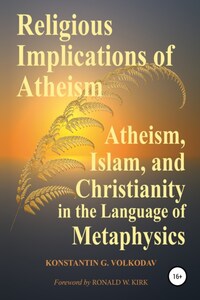Language: English
This is a translation from Russian into English of the book Религиозные Аспекты Атеизма: Атеизм, Ислам и Христианство на языке Метафизики. Translated by the author.
Unless otherwise noted, all Scripture quotations are taken from the New Revised Standard Version (NRSV) of the Bible, copyright © 1989 National Council of Churches of Christ in the United States of America. Used by permission. All rights reserved worldwide.
Scripture marked KJV comes from the King James Version.
Scripture marked LXX (in Greek) comes from the Biblia Graeca IVXTA LXX Interpretes (Septuaginta).
Praise for the Religious Implications of Atheism
A very good and timely book! Today, many people who seek God or hesitate in thought, especially observing the position, behavior and lifestyle of the Church hierarchy of various confessions, unfortunate people, easily fall under the influence of atheistic propaganda. This book is a wonderful answer and refutation of this propaganda, written by a very good and competent theologian. Comments are intelligible and well-grounded, easy and interesting to read! I recommend to everyone!
–Sergey N. Kurtalidi,
historian, theologian (Athens)
The format of this book is very interesting—a discussion within a discussion. I hope that the questions posed by the author will resonate with readers, and a discussion will emerge that expands and complements this debate. The book is written in good language, easy to read and interesting. The density of thought is high. I also want to note that the author’s proposal to read selectively interested topics makes sense. The book is made so that it can be read in arbitrary parts, and not just sequentially. The book touches upon not only theological and philosophical aspects, but also publicistic and historical prospects.
–Yaroslav Taran,
poet, writer, editor-in-chief of the portal “Air Castle” (St. Petersburg)
Atheism except by the grace of God is hardwired into mankind’s spiritual DNA. The original sin made us think we were clever. Our thoughts were equal to the Creator’s thoughts, or superior. So rather than judge ourselves by God’s Word as we ought, we routinely choose to judge God by our fallen, humanistic standards. Thus, practical if not philosophical atheism prevails in the world. We know God, but we naturally and universally suppress the truth in unrighteousness to our own hurt (Rom. 1:18).




